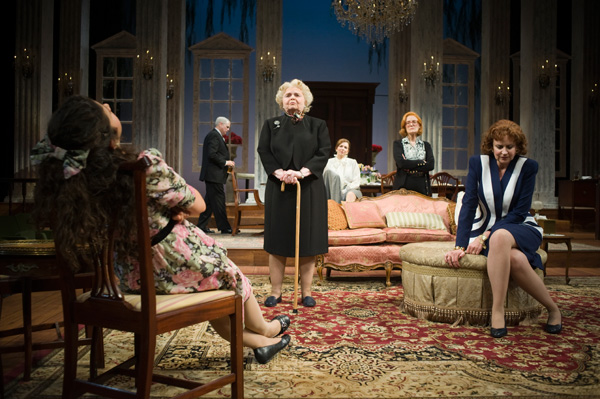ARNOLD WAYNE JONES | Life+Style Editor
jones@dallasvoice.com
“They were lazy and no good but they came from lovely families,” declares Mama (June Squibb), matriarch of the Gordon family of tiny Harrison, Texas. It’s a line that really sets the bar for your appreciation of Horton Foote’s Dividing the Estate: You either get the joke (and the fact it’s not really a joke at all) or you don’t. This is a play that targets a Southern audience and assumes everyone else will just sleep in the weeds for two hours. And it’s OK with that.
I am, too. There’s a proud, fine tradition of Gothic Southern theater that runs a gamut from campy hoots (Del Shores, the Tuna guys) to strained melodrama (Tennessee Williams, especially his later stuff). There’s been a renaissance of it lately, with Broadway productions of Tracy Letts’ awesome epic August: Osage County and Dividing the Estate, both of which tweak and (dare I say) improve upon their source material: King Lear and The Little Foxes, classics about crotchety old folks who use money to control their families and expect the world to conform to their will. I’ve known women like Mama; I called one Grandma.
 The Dallas Theater Center’s current production at the Wyly, directed with astonishing sure-footedness by Joel Ferrell, is a crackerjack comedy filled with death, lung-emptying sibling in-fighting and money-grubbing, and if that doesn’t sound like the stuff of comedy to you, you might be a Yankee.
The Dallas Theater Center’s current production at the Wyly, directed with astonishing sure-footedness by Joel Ferrell, is a crackerjack comedy filled with death, lung-emptying sibling in-fighting and money-grubbing, and if that doesn’t sound like the stuff of comedy to you, you might be a Yankee.
Set in the mid 1980s, it captures the fashions and Reagan Era social climbing with uneasy accuracy. Mama’s three kids — Lucille (Gail Cronauer), Lewis (Kurt Rhoads) and Mary Jo (Nance Williamson) — are all in need of money, and debate whether they should divide the estate now or wait for Mama to die. None has ever worked a day in their lives, so they see the farmland, largely fallow, as some magical money machine. Mama will have none of it, but her resistance really just causes more problems.
John Arnone’s quasi-expressionistic set conjures the end of gracious living: A moldering plantation manor in need of a paint job, a faded memory of a once-glorious monument to glamour… much like the Gordon family itself. But the performances are what really sell the play. Williamson’s blowsy Houston wannabe socialite is a testament to superficiality. Rolling her eyes and hissing her lines, Williamson gives Mary Jo a swagger out of proportion to her own abilities. Her uncontrolled avarice is a study is slapstick. She contrasts beautifully to Lynn Blackburn’s Pollyanna centeredness as an outsider about to marry into the family. Akin Babatunde seems to have a rhythm all his own, a sing-songy cadence as the 92-year-old servant who engenders more respect than any of the children.
But at the heart is Squibb: Lips pursed, jaw set like a shovel in the ground, eyed focused so narrowly, Mama cannot see the big picture. You sympathize with her even as you know the mistakes she’s making — just like your family, probably — certainly mine. Dividing the Estate resolves nothing; it merely reminds us that that’s how it always is.
This article appeared in the Dallas Voice print edition March 25, 2011.
















